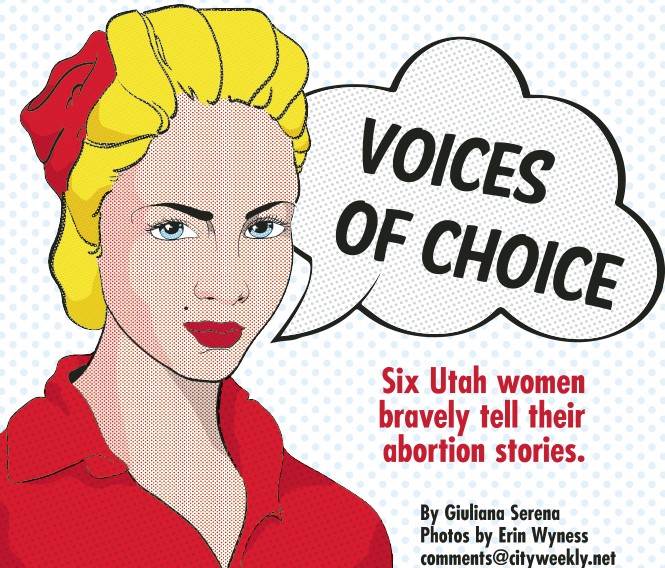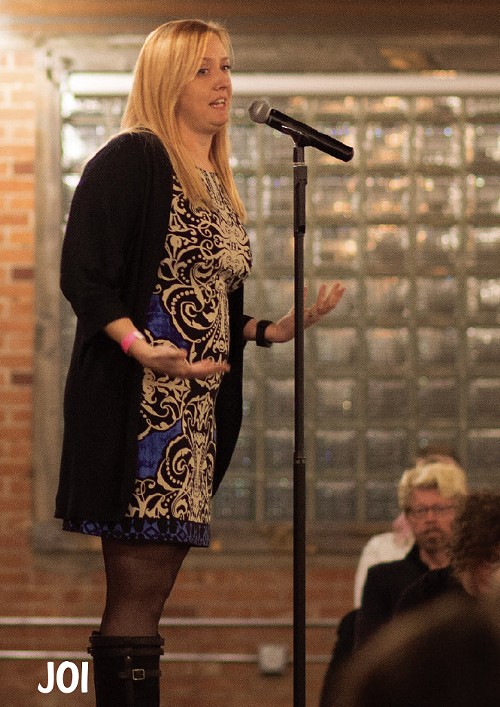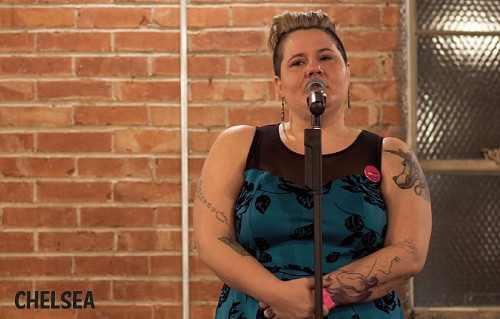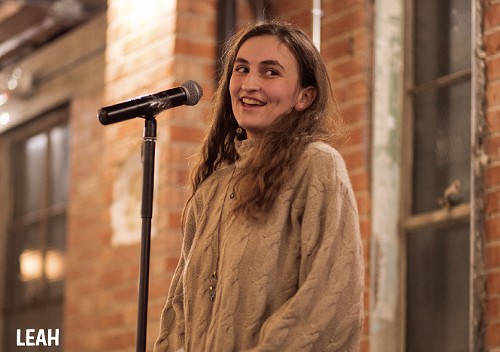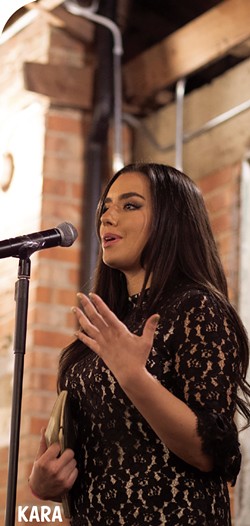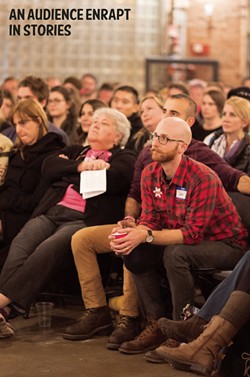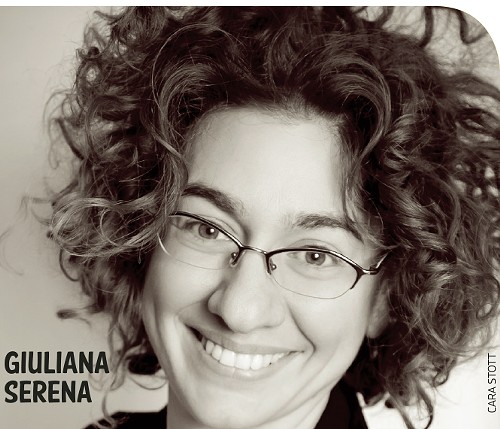You know someone who's had an abortion. No doubt about it. In fact, if you're a woman living in America, there's a one-in-three chance that you will have at least one in your lifetime. It's that common.
Not sure if you know someone? It makes sense that you wouldn't know whether professional colleagues, casual acquaintances or distant relatives have experienced one or not—it's one of "those things we don't talk about," along with sex and menstruation and fertility and the kinds of information that actually helps avoid the need for abortion (but I digress). What you may not realize is that the same social stigma keeps even those closest to you—your mother, sister, partner, daughter, close friend—from telling you, as well.
And why haven't they told you? Women are routinely judged, shamed and labeled regarding choices they make about their bodies, sexuality and autonomy; the way we treat abortion in our society is a prime example. This very stigma is what needs to change. Women have abortions. Good women have abortions. And their stories need to be heard.
In an effort to do just that, Planned Parenthood Association of Utah (PPAU) invited me to host its annual Roe v. Wade anniversary celebration, with a focus on storytelling. And this past Jan. 23, on the 43rd anniversary of the Supreme Court decision that legalized abortion nationally, we did just that: We threw a party to tell and listen to abortion stories.
Six women in our community, from all walks of life and with varied experiences, took the stage that night. It turned out to be more beautiful and powerful than I could have hoped for. It was most certainly a night to remember for everyone involved.
The intention was to shine a light on these particular stories, experience them together as a community and then share them far and wide, so they can reach those who need to hear them most. Of course, I was really excited to be invited to share them with City Weekly readers.
What you'll find in the pages ahead are excerpts of the stories told on stage that night.
A ROE V. WADE PARTYIt's dark and cold night in late January—and Publik Coffee Roasters on West Temple is aglow, filled to the brim with nearly 400 lively guests, eagerly anticipating an evening of community and storytelling while enjoying cocktails and appetizers.
The feeling is electric; people are genuinely excited and happy to be there. It's a good party. Any fears whatsoever of it being odd to have a party and tell abortion stories is long gone.
Once we're ready for stories, everyone has a seat and a hush falls over the crowd.
It's a time for reflection about what each one of us believes. You probably have deeply held beliefs about abortion, and speeches and vitriol from someone with an opposing view is unlikely to sway you; in fact, they might just have the opposite effect.
But stories? They have the power to change us. When we hear someone speak from the heart, with conviction and vulnerability about their lived experience, we are much more likely to be moved. So, it's brave to be the one telling a story, and it's brave to really listen (or read one), especially if it challenges your deeply held beliefs.
Joi39, Digital Media Consultant
"I have a confession to make: It is really hard being a robot living amongst all you humans," Joi says. "That is to say that I am, by default, a hyper-rational, non-emotional kind of person. But I've developed a lot of coping mechanisms to deal with it for myself, but mostly for all of you. I practice how to act like a normal person, and I've gotten quite good at it. Some people actually consider me an extrovert, or a people person. ...
"So when I found out that I was pregnant, I knew I had my work cut out for me. I was 28 years old, living the ideal Chicago urban life ... at the beginning of what has turned out to be a really successful career.
"I was in my dating phase that I affectionately call my "'80s Bully Phase" because they were all tall, blond and jerks. If you can picture the blond guy from The Karate Kid—yeah, that was my type."
What Joi and the "'80s Bully" had in common was that neither wanted commitment. Joi was at the beginning of an upward trajectory and didn't want to be tied down by relationship or family quite yet.
It was fall, and she didn't feel right; she was overeating and feeling nauseous. She had just switched from the pill to NuvaRing and wasn't using backup protection in the interim. Her friends thought she was just stressed, but she knew she was pregnant and went to see her gynecologist.
Her doctor confirmed her suspicion, but because of the religious affiliations of the hospital, she had to seek treatment elsewhere. She made an appointment with the nearest Planned Parenthood clinic.
The actual experience of the abortion was relatively simple for Joi. She was expecting to be greeted by protesters, but the streets were clear. The clinic felt safe and welcoming, and she appreciated the care they showed her. The staff took her through a psych evaluation and provided a volunteer companion during the procedure. All in all, she said, it ended up feeling like a typical doctor's visit. In fact, it didn't stop her from taking off for a weekend getaway with "'80s Bully," who picked her up when she was done.
The most transformative part of Joi's story came about a week after the procedure, when she gathered her girlfriends together to tell them what she had done. She had been dreading it as some of her friends were conservatively leaning, and one in particular was struggling to conceive.
"I have a really bad habit of speaking super nonchalantly about topics that other people find very traumatic. I didn't want to accidentally mention it in casual conversation and upset any of them. So, I put out some wine and cheese, raised a glass, and braced myself to tell them what I had done," she says.
"I had an abortion," she announced.
At first, they stared blankly. Then, they asked some questions, but none were horrified as she had feared. She was taken aback at first, and then the stress just melted away, and they spent the rest of the evening talking casually about reproduction, politics and their experiences. Some had stronger emotions than others, but they were totally accepting of Joi's ambivalence.
"And what they really, really clarified for me was I didn't need to feel guilty about not feeling guilty," she said. "I realized that day that while some people have very, very strong emotions that are very, very valid surrounding their decision to terminate, there's a lot of people who are like me, and our stories don't really get to be heard that often.
"Because I'm not actually a robot," she said. "I'm a normal person just like all of you."
DelAnne37, FULL-TIME MOM
DelAnne takes the stage to share what is the most tearful story of the night. With her toddler daughter, Presley, in her arms, she sang a song from her childhood:
"When I grow up, I want to be a mother, and have a family. One little, two little, three little babies of my own/ When I grow up, I want to be a mother, and have a family. Four little, five little, six little babies of my own."
She continues, "No matter what I say today, [Presley] is my reason for supporting Planned Parenthood. And my reason for supporting everyone's choice."
DelAnne decided she would be a mom when she was 3 years old. Raised in an LDS home, she knew she would wait to start her family until being married in the temple. In her senior year of high school, she was an honors student, had the lead in a musical and was in a great relationship with her boyfriend of three years. He wasn't LDS, and he knew she wanted to wait until marriage. He didn't pressure her into having sex.
But one fateful day, in a fit of hormonal rage after a fight at home, she called him up, told him they were going to have sex, and they did. Only afterward did it even occur to her they hadn't used protection.
In school, they'd both had abstinence-only education, and she had never even seen a condom.
Still, DelAnne knew she needed to take action and had heard about Plan B, also known as the "Morning-After Pill," which is most effective when taken within 72 hours after intercourse. It wasn't available over the counter at that time, so her boyfriend couldn't pick it up for her. Because of her work schedule, she was well into Day 3 before she made it to a pharmacy.
After a few days, when she still hadn't gotten her period, she knew she was pregnant.
She and her boyfriend wanted to get married someday and "do it right," as she says, and have a family. To have the best chance of making that happen in the future, they chose to have an abortion. She initially wanted to go to the Planned Parenthood clinic, but they wouldn't let her boyfriend join her in the room for the procedure, so they went to another facility. Once there, her boyfriend came back with her, but they sent him out for the initial exam and never let him back in.
"It's the closest thing that I've experienced to what I can only imagine sexual assault is like," she says. " ... Nobody explained anything." It was so upsetting to her, in fact, she experienced post-traumatic stress syndrome and became suicidal. Getting through all that, she and her boyfriend eventually did get married, though they separated and divorced a couple of years later.
"And we got pregnant again right when our divorce was final. And I was suicidal. So, I made another choice and, that time, my choice was to live because I knew that if I didn't survive, it wouldn't matter."
She had a second abortion, and she and her husband went their separate ways. Still, she wanted nothing more than to be a mother.
Eventually, she remarried, and at 35, with steady employment and health insurance, decided she was finally ready to start a family. And she got pregnant. She then experienced what is often called a "missed" or "silent" miscarriage, known medically as a "missed abortion." Essentially, the fetus is no longer viable, but her body didn't expel it. And though the process would likely complete on its own within several weeks' time (but, in some cases, it needs intervention regardless), she didn't feel mentally or emotionally stable to wait. She asked her doctor for a pill to help move it along. "And he looked at me so weird," she said, "and now I realize, it's because, technically, I was terminating another pregnancy."
But that's what DelAnne ended up doing.
"And now," DelAnne says, "I have Presley. And her pregnancy was really hard. I barely made it through. But every single choice I made, including the day [I took] that pill to [getting] my miscarriage out, it made [Presley] who she is. And damn, I'm grateful. So, thank you everyone for sticking up for everyone's choices, my daughter's choice."
DelAnne ends with another song, dedicated to her daughter:
I set out a narrow way, many years ago.
Hoping I would find true love, along the broken road.
But I got lost a time or two, wiped my brow, kept pushing through.?
Because I didn't see how every sign pointed straight to you.
Because every long, lost dream led me to where you are,
And others who broke my heart, they were like Northern Stars,
Pointing me on my way, into your loving arms.
This much I know is true,
That God blessed the broken road
That led me straight to you.
40, Account-Development Specialist
"For a very long time, I lived with a dichotomy of two selves," Chelsea says. "On one hand, I was very curious about the world. I loved fantasy and wanted to know the answer to every 'why' question. And I firmly believed that I would be invited to live on the first space station or on the moon one day. On the other hand, I wanted to be the good girl. And I learned how to be her by watching my mom. I was going to grow up to be a mom. I was going to have kids. I was going to get married and have the perfect little house and the perfect little life.
"At 18, I was married. By 19, I was pregnant. But by 25, I was divorced twice with two sons, no family support and nowhere to go. I gave up my two sons, and I went on the road. I answered all of those 'whys,' and I traveled the country. I met wonderful people, and I saw lots of amazing things.
"And then about five years ago, I found myself back in Utah. I was on good-girl territory [and] was going to do it right this time. This was going to be the Second Coming of Chelsea. I met the perfect guy—he had the scruffy beard and the little nerdy glasses. He was enough of a sarcastic jerk that I knew I could be totally honest with him. And, as the relationship progressed, we discussed birth-control options. I'd had my faithful IUD removed about a year earlier, and I told him it was his turn, it was the man's turn to be in charge of the birth control.
"He did not want to have a vasectomy," she said, "which, of course, brought up, 'Well, what if we get pregnant?' And I said, 'I really hoped that I would have another child one day.' And he said, 'I'm not really sure what I want,' which means, I heard: 'It's OK if we get pregnant.'"
On their one-year anniversary, they had unprotected sex, and Chelsea became pregnant. She was ecstatic. He wasn't. He didn't want the baby. "I was devastated. My whole world ended. Reality ceased to exist. This isn't like when you drop the glass in the sink, and it breaks into three or four pieces, and you can pick it up and throw it away, and move it on. It's fine. This was dropping your favorite bottle of perfume, and it shattering all over the floor, and you find pieces in corners months and years later, and the smell is forever ruined."
They argued for a couple of weeks and, eventually, he told her that he couldn't promise they would stay together. She felt strongly she did not want to raise a child without support nor did she want to give a child up, so she had the procedure done. They never talked about it. A few months later, he moved out, and she built up a really big, emotional wall around herself.
"I was very angry," Chelsea says. "And I grieved a lot for my two boys, for the loss of self, for the self of future, for the loss of reality. And then one day, I was scrolling through Facebook, and I saw that Gov. Herbert had made an executive decision to defund Planned Parenthood in Utah. And I was furious.
"I tore down that wall. And I said, 'No more.' This is my choice. My abortion was my choice. This is my life, not my mother's. And that is the day that I was born."
Leah19, student & Planned Parenthood organizer
Leah's story starts when she was just 14, living in Manhattan's Upper West Side—a high-end part of town. A junior at a magnet high school (she's skipped two grades), she's adamant about going to college, certain that it's going to get her everything she needs in life. Her parents are split up, with her mother living in another state, and her father spending most of his time with his long-term girlfriend. Even though she's quite young, she mostly takes care of herself.
"By the time I was in third grade," she says, "I could go to and from school by myself, and go home with my friends and make my own social calendar. By the time I was 10, I had smoked weed for the first time. By the time I was 11, I got drunk with my friends for the first time. And when I was 13—like most of my friends as far as I knew—I had sex for the first time.
"But now, I'm pregnant. I'm just another teen who's knocked up, and I'm a statistic who does not want to be one. ... I know what I need to do, I know that I need an abortion."
Leah went to a friend for advice. "'It's really easy,'" her friend told her. All she needed to do was go downtown to Planned Parenthood. "'Tell them you're a student ... you do drugs ... you make no money—it's fine. You just need to be honest with them if they're going to help you.'"
The next day, instead of going to school, she took the downtown train to the Margaret Sanger Center. She filled out her personal history form, "with honesty I did not know I still had in me. Yes, I'm a drug user; yes, I smoke. Yes, I have felt unsafe before with people I've been in relationships with. And I went through a lot of doors that day based on the answers to those questions.
"So, yes, I had a non-traumatic medical procedure of an abortion," Leah says. "And in addition to that, I talked to a nice woman who gave me patches so I could stop smoking. I also talked to a nice man who was the first person to really make me think about my drug use. And I got into a crisis-intervention, adolescent drug-treatment program that I didn't even need parental consent for, that I could start downtown. And I had safe places to go that another woman told me about. And at the end of all that, they even gave me a medical excuse note so I could go back to school," Leah says.
"I moved on. It was tough for a while. Things didn't get better for a little bit, but then they did, and it kept getting better. And it keeps getting better. I got out of that relationship, I got off those drugs, and I graduated high school. I used the money that I had been saving to go to Chile, and I learned Spanish. Then I finally got my dream, and I started at Westminster College.
And it did really launch me into the life that I was looking for. Salt Lake City had all of the resources that I wanted, and I started my public-health program.
Leah got involved with Planned Parenthood and created a Students for Choice chapter at her school. She then started interning at the Planned Parenthood affiliate and, just before Christmas 2015, was named to the National Board of Young People serving the Planned Parenthood Federation.
"I'm just so grateful that Planned Parenthood thought that I, at 14, was a person worth preserving. I'm just so lucky to have such a fulfilling life that they brought within my reach, ... a life that I get to share with a beautiful woman and something that I just didn't think was going to be possible for me as a young teen."
Kara26, Clinical Assistant
About her mother, Kara says: "Sofía Vergara's character [from Modern Family] is my mother to a T.
"My mother is Gloria," she says, "but she's also very LDS. So, not only did she always put the fear of God in me, but she also was very superstitious; she believed in black magic. I believed that anything that I did, any sin that I would commit, not only was I going to be damned to hell, but I would have bad luck for the rest of my life.
"Growing up, I was really awkward. I had a back brace, I wasn't very cute, I couldn't talk to anybody, and I just loved reading and ... music.
"So when my mom sat me down in my back brace to talk about sex," Kara says, "I was completely mortified. And not only that, she couldn't say the word 'sex'; she called it 'chaka-chaka.'"
Kara didn't get a very comprehensive education about sex. Eventually, she got out of her back brace, and she blossomed, though she still felt awkward inside. After high school, she met someone who took her breath away.
"He was like the hot guy from all the movies, and he finally learned that the nerdy girl was cool and, like, kind of cute."
They started dating and were immediately infatuated with one another. "We're gonna be together forever," she thought. It wasn't long before they had sex. And as quickly as things got serious, they got dangerous, though she didn't realize it at the time.
He became paranoid, incessantly calling and texting her. She said it went from, "Hey, why aren't you answering me?" [to] "You're sleeping with somebody. You're such a slut," to "'Babe, I love you so much. Please just answer my call, I want to be with you forever."
One day, he shows up at her house and demands she get in his car. They begin arguing, and he stops abruptly, "So you're going to end things with me?" she recalls him asking.
"I'm trying to be brave and stand up for myself and, as he's saying that, the hairs on my neck and my arms kind of stand up," she says. "Before I can finish saying, 'Yes,' he totally backhands me and breaks my nose. And all I remember in that moment was just a pop, and a flash of white. And the next thing I knew, we were still driving around, and I was kind of in shock. I just have blood everywhere."
The next morning, it's clear her nose is broken. Her lip is busted, and her face is black and blue and swollen. Her family knows exactly what happened. Over the course of the next few days, she starts getting sick and decides to take a pregnancy test. When the test is positive, she's heartbroken—not only to be pregnant but to be tied to an abuser she wants nothing to do with anymore. She's emotionally distraught and doesn't know what to do.
A couple of days later, she is lying in bed after school, staring at the ceiling, when her mother appears by her side. "She grabbed my hand, and she just looked at me. She said, very calmly, 'Kara, I know that you're pregnant. You are my daughter. I hurt when you hurt. And I love you because I know you.'"
Kara is dumbfounded by her mother's insight. She hadn't told anybody nor had she taken the pregnancy test at home. She storms out of the house and meets up with her boyfriend. She tells him she's pregnant, and he responds by punching her in the stomach, saying he doesn't want her to have the baby anyway. So she reluctantly returns home. With one look at her mother, she knows what is going to happen. Her mother takes her to have her abortion, and she cuts ties forever with her ex-boyfriend.
"Thanks to my mother, she gave me a voice when I didn't have a voice," Kara says. "Thanks to the amazing clinic, staff, that made me feel human for the first time in the six months since I had started seeing that guy. I'll never be more grateful for anything in my entire life."
Kara now works at Planned Parenthood.
Leah T.36, OB/GYN physician
Leah T. is our final storyteller of the night, who, as a physician providing abortion services to Planned Parenthood, offers a unique perspective. "So, once I finish the abortion," Leah says, describing the care she gave to a patient, "I told her what I typically tell all of my patients; 'The procedure is done, everything went really well, and you did really great.' And then [this patient] burst into tears."
Up to that point, Leah's day had been pretty typical: waking up, drinking coffee in the kitchen, scrolling through Twitter. She read tweets with messages like, "thanks for all you do," and "you're my 'sheero,'" and "I hate you, you baby killer. #butcher."
That's all par for the course for Leah T. Every day as she arrives at work, she's confronted by the familiar faces of protesters who stand outside the clinic. Some have signs that say, "Pray to End Abortion" and "Stop the Murder"; some have small children in tow, even in rainy, 40-degree weather.
But she drives past and goes inside. She's greeted with smiles—actual smiles—because everyone working at the clinic loves being of service. She sits at her computer and looks over the day's schedule. It's made up of "abstract things, like how many weeks and what kind of procedure."
Through the course of her day, the names of strangers become real people as they enter her office, sharing real stories of their lives with her. "It's an amazingly unique privilege," she says, "and I love it. It's fantastic."
After seeing a number of patients, she finds herself with the one who bursts into tears. And at that moment, her heart sinks, and she wonders, "What have I done? What's just happened?" She asks if her patient is all right, if she's in pain. Through tears, her patient reassures her, "You know, I'm OK; it's not you, it's them."
Leah knows who her patient is referring to: the protesters outside. Before she could respond, the young woman continued, "They don't know me. They know nothing about my situation. How dare they judge me for doing what's best for me and my family?"
Leah replied, "I really commend you for doing that, and for being here and doing what's best for you. I think that that's an amazing thing. Take your time. Go ahead and get dressed; we'll take you to the recovery room."
The young woman left, and Leah continues to see other patients. At the end of the day, she drives past the same protesters as before, knowing she'll see them again, if not on the sidewalk, then on her Twitter feed, or at the Planned Parenthood rallies, or in the legislative offices. The very next day, she gets up as usual, and sits with her coffee to scroll through Twitter. One tweet stands out: "LeahTorresMD abortionist is a sick, evil, twisted person with no conscience and no savior. You will burn in hell for murdering babies." The poster added: "and because you don't value life, I don't value yours. So forgive me if I don't cry if you are ever killed by another murderer."
Most of her friends are frightened by such statements, but she sees them differently. She knows that trolls want to shame her with the fear of damnation. But Leah isn't dissuaded in the least. "In the end," she says, "this vitriol, this hate, it strengthens my resolve to provide the compassionate care that people not only need, but they also deserve."
EpilogueAs our night comes to an end, we are reminded of how far we have come, and how far we still have to go in securing women's basic right of autonomy and decision-making power over our bodies. In the current political climate, and with critical court cases being argued across the country, those of us advocating for women's rights have our work cut out for us.
I myself was truly grateful to be a part of it and—if you've read this far—that we have been able to share a piece of it with you. It simply would not have been possible without our brave storytellers and enthusiastic audience, the organizational efforts of Planned Parenthood, especially Kate Kelly and Emily Andrews, Elna Baker of This American Life and The Moth for coaching our storytellers at our workshops in December, and Leah Hayes, author of Not Funny Ha Ha, for her visual storytelling workshop.
As for final words, I'll leave you with the closing remarks from PPAU president/CEO Karrie Galloway, "Make sure the sex you have tonight is good, safe and consensual." CW
Giuliana Serena is a ceremonialist & rites-of-passage facilitator (MoonTimeRising.com), and "Beekeeper" and co-founder of The Bee: True Stories from the Hive (TheBeeSLC.org).
Learn more about Planned Parenthood Association of Utah and get involved at PPAU.org.
Latest in Cover Story
Readers also liked…
-
Forget the family pedigree—Robert F. Kennedy Jr should not be the next president of the United States
Trojan Horse
- Jun 21, 2023
-
Women decry harassment and toxic culture at St. George auto dealership
Men at Work
- Oct 11, 2023


